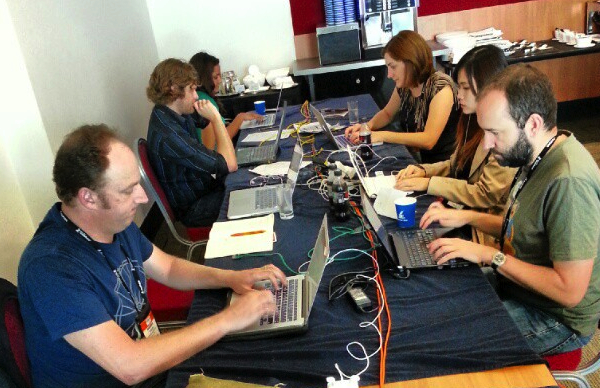 TechEd is Microsoft’s annual developer conference, and TechEd Australia 2013 kicks off this coming Tuesday 3 September. ZDNet Australia had commissioned me to cover it, from a room much like the one pictured — just like I did last year — but now it’s all off. Because Microsoft has banned me.
TechEd is Microsoft’s annual developer conference, and TechEd Australia 2013 kicks off this coming Tuesday 3 September. ZDNet Australia had commissioned me to cover it, from a room much like the one pictured — just like I did last year — but now it’s all off. Because Microsoft has banned me.
On 1 August, I emailed ZDNet Australia editor Chris Duckett to accept his commission. But on 6 August, he phoned me, pissing himself laughing, to say that the message from Microsoft — I don’t know from who or how it was delivered — was a no-go. I’m banned from TechEd for “being aggressive to speakers”.
Now I, too, was pissing myself laughing. I was nearly in tears!
“Aggressive to speakers”? Let’s be clear. Any problems were about one speaker, singular. And this alleged aggression — which I’d characterise more as ridicule, mockery and outrageously hyperbolic violent imagery, as is my well-worn shtick — happened solely via Twitter.
Now I’ve thought long and hard about whether to tell this story. Personally, I don’t really care. I’m happy to avoid spending most of next week in that hell-hole called the Gold Coast, and I’ve got plenty of other things to get on with. And Microsoft does have the right to decide who they will and won’t allow into their event — especially when they’re paying.
But I’ve decided to go public because I’m a big fan of transparency — as reflected in my blog posts from 2007, Releasing the Black Hawk crash video was A Good Thing, Scaring the shit out of clients and Being Real: more notes on radical transparency.
I think you should know about this ban, because it potentially affects the quality of my coverage and analysis of Microsoft as it faces some interesting challenges — more about that another time. I’d like you to be informed consumers of my work, which is why I list all the corporate largesse I receive in my Weekly Wrap posts.
I was also under the impression that any problems which may have arisen were all sorted out at the time. Certainly no-one at Microsoft has ever mentioned any problem to me since then.
Quite frankly, to bad-mouth me to one of my commissioning editors — in an undocumented phone call, no less! — strikes me as a tad defamatory.
And without any communication with me? From an organisation that wants customers to trust it with our most intimate and confidential data? Does this not represent a glaring absence of due process?
So, in the tradition of another 2007 post, “Let’s just write that down…”, I’m just going to write it all down, and put my name to it. That’s what honest people do, right?
Come with me, boys and girls, as I tell you about TechEd Australia 2012’s keynote speaker, Jason Silva, “futurist, filmmaker, epiphany addict [WTF?], ecstatic truth lover [WTFF?], techno optimist”. Check his Wikipedia entry and personal website.
Continue reading “Microsoft has banned me from covering TechEd”


 I dealt with a strange request from Vodafone this week. They wanted to fix a broken link in one of my blog posts from
I dealt with a strange request from Vodafone this week. They wanted to fix a broken link in one of my blog posts from 